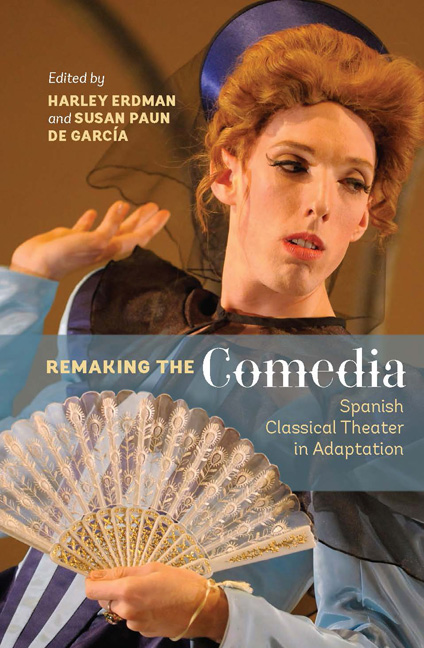Book contents
- Frontmatter
- Contents
- Illustrations
- Contributors
- Preface
- Note to the Reader
- Acknowledgements
- PART I THEORIZING
- PART II SURVEYING
- PART III SPOTLIGHTING
- 11 The Dog in the Manger: The Continuum of Transformation
- 12 El caballero de Olmedo: Los Barracos's Baroque Gentleman
- 13 Corpus Lorqui: Transformation and Transubstantiation in Los Barracos de Federico’s El caballero de Olmedo
- 14 The Phoenix of Madrid: Calderón's No hay burlas con el amor Reborn in Bath
- 15 A Prince in Pittsburgh: “Recasting” a Contemporary Staging of The Constant Prince
- 16 Directing Marta the Divine: Provocative Choices in the Service of the Story
- 17 The Dramaturgy of Absence: Minding the Gaps in Tirso de Molina, Ana Caro, and Feliciana Enríquez
- 18 Translations and Transgressions: Twenty-First-Century Questions Regarding Zayas
- 19 Comedia Actresses, Then and Now: The Case of Ana Caro's Valor, agravio y mujer
- 20 “Kinesthetic Empathy” and the Comedia refundición
- PART IV SHIFTING
- Play Titles Cited
- Works Cited
- Index
17 - The Dramaturgy of Absence: Minding the Gaps in Tirso de Molina, Ana Caro, and Feliciana Enríquez
from PART III - SPOTLIGHTING
Published online by Cambridge University Press: 05 December 2015
- Frontmatter
- Contents
- Illustrations
- Contributors
- Preface
- Note to the Reader
- Acknowledgements
- PART I THEORIZING
- PART II SURVEYING
- PART III SPOTLIGHTING
- 11 The Dog in the Manger: The Continuum of Transformation
- 12 El caballero de Olmedo: Los Barracos's Baroque Gentleman
- 13 Corpus Lorqui: Transformation and Transubstantiation in Los Barracos de Federico’s El caballero de Olmedo
- 14 The Phoenix of Madrid: Calderón's No hay burlas con el amor Reborn in Bath
- 15 A Prince in Pittsburgh: “Recasting” a Contemporary Staging of The Constant Prince
- 16 Directing Marta the Divine: Provocative Choices in the Service of the Story
- 17 The Dramaturgy of Absence: Minding the Gaps in Tirso de Molina, Ana Caro, and Feliciana Enríquez
- 18 Translations and Transgressions: Twenty-First-Century Questions Regarding Zayas
- 19 Comedia Actresses, Then and Now: The Case of Ana Caro's Valor, agravio y mujer
- 20 “Kinesthetic Empathy” and the Comedia refundición
- PART IV SHIFTING
- Play Titles Cited
- Works Cited
- Index
Summary
All dramatic texts hold a tension between what is explicitly inscribed on the page and what, while absent, is nevertheless implied. While this tension derives from many factors, it is ultimately rooted in the dueling audiences to which theater scripts make their appeal. On the one hand, plays have in some fashion a literary function. They communicate to an imagined posterity (including directors, actors, etc.) the intentions and the authority of their creators at a time when the author is absent. On the other hand, scripts also document the circumstances of their original performances: what lines the actors said and what major stage directions they undertook. But playtexts are highly imperfect instruments; they are inevitably shot through with fissures, gaps, inconsistencies, since capturing a live performance is an impossible dream. A script, then, is the residue of a live moment masquerading as something permanent, inviting repetition. This haunted quality of the text speaks to why theater powerfully fosters, to cite Marvin Carlson, “a simultaneous awareness of something previously experienced and of something being offered in the present … which can only be fully appreciated by a kind of doubleness of perception” (51). An adapter of classical theater, I believe, must be attendant to these gaps, these ghosts of the original performance haunting the interstices of the written text.
At first glance, Spanish Golden Age comedias may not appear to be so shot through with these fissures. Unlike Shakespeare's plays, they generally do not present major variants; there are no questions akin to Folio vs. Quarto, and hence textual questions tend toward matters of editorial minutiae. Comedias also follow a highly regular, transparent dramaturgical formula. Virtually all are divided into three acts; there is no ambiguity about where these act breaks fall; and each act has its own clear internal structure with a beginning, middle, and end, situated within an overall linear plot that is roughly Aristotelian, as filtered through Lope. Perhaps most importantly, comedias feature rigid versification schemes.
- Type
- Chapter
- Information
- Remaking the ComediaSpanish Classical Theater in Adaptation, pp. 167 - 176Publisher: Boydell & BrewerPrint publication year: 2015



